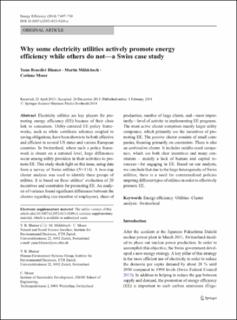Bitte benutzen Sie diese Kennung, um auf die Ressource zu verweisen:
https://doi.org/10.21256/zhaw-3499| Publikationstyp: | Beitrag in wissenschaftlicher Zeitschrift |
| Art der Begutachtung: | Peer review (Publikation) |
| Titel: | Why some electricity utilities actively promote energy efficiency while others do not : a Swiss case study |
| Autor/-in: | Blumer, Yann Benedict Mühlebach, Martin Moser, Corinne |
| DOI: | 10.1007/s12053-013-9249-z 10.21256/zhaw-3499 |
| Erschienen in: | Energy Efficiency |
| Band(Heft): | 7 |
| Heft: | 4 |
| Seite(n): | 697 |
| Seiten bis: | 710 |
| Erscheinungsdatum: | 2014 |
| Verlag / Hrsg. Institution: | Springer |
| ISSN: | 1570-646X 1570-6478 |
| Sprache: | Englisch |
| Fachgebiet (DDC): | 333.79: Energie |
| Zusammenfassung: | Electricity utilities are key players for promoting energy efficiency (EE) because of their close link to consumers. Utility-centered EE policy frameworks, such as white certificate schemes coupled to saving obligations, have been shown to be both effective and efficient in several US states and various European countries. In Switzerland, where such a policy framework is absent on a national level, large differences occur among utility providers in their activities to promote EE. This study sheds light on this issue, using data from a survey of Swiss utilities (N=114). A two-step cluster analysis was used to identify three groups of utilities. It is based on these utilities’ evaluation of 20 incentives and constraints for promoting EE. An analysis of variance found significant differences between the clusters regarding size (number of employees), share of production, number of large clients, and – most importantly – level of activity in implementing EE programs. The most active cluster comprises mainly larger utility companies, which primarily see the incentives of promoting EE. The passive cluster consists of small companies, focusing primarily on constraints. There is also an ambivalent cluster. It includes middle-sized companies, which see both clear incentives and many constraints – mainly a lack of human and capital resources – for engaging in EE. Based on our analysis, we conclude that due to the large heterogeneity of Swiss utilities, there is a need for contextualized policies targeting different types of utilities in order to effectively promote EE. |
| URI: | https://digitalcollection.zhaw.ch/handle/11475/2191 |
| Volltext Version: | Publizierte Version |
| Lizenz (gemäss Verlagsvertrag): | Lizenz gemäss Verlagsvertrag |
| Gesperrt bis: | 2020-01-01 |
| Departement: | School of Engineering |
| Organisationseinheit: | Institut für Nachhaltige Entwicklung (INE) |
| Enthalten in den Sammlungen: | Publikationen School of Engineering |
Dateien zu dieser Ressource:
| Datei | Beschreibung | Größe | Format | |
|---|---|---|---|---|
| 2014_Blumer_Why some electricity utilities actively promote energy efficiency_Energy Efficiency.pdf | 497.82 kB | Adobe PDF |  Öffnen/Anzeigen |
Zur Langanzeige
Blumer, Y. B., Mühlebach, M., & Moser, C. (2014). Why some electricity utilities actively promote energy efficiency while others do not : a Swiss case study. Energy Efficiency, 7(4), 697–710. https://doi.org/10.1007/s12053-013-9249-z
Blumer, Y.B., Mühlebach, M. and Moser, C. (2014) ‘Why some electricity utilities actively promote energy efficiency while others do not : a Swiss case study’, Energy Efficiency, 7(4), pp. 697–710. Available at: https://doi.org/10.1007/s12053-013-9249-z.
Y. B. Blumer, M. Mühlebach, and C. Moser, “Why some electricity utilities actively promote energy efficiency while others do not : a Swiss case study,” Energy Efficiency, vol. 7, no. 4, pp. 697–710, 2014, doi: 10.1007/s12053-013-9249-z.
BLUMER, Yann Benedict, Martin MÜHLEBACH und Corinne MOSER, 2014. Why some electricity utilities actively promote energy efficiency while others do not : a Swiss case study. Energy Efficiency. 2014. Bd. 7, Nr. 4, S. 697–710. DOI 10.1007/s12053-013-9249-z
Blumer, Yann Benedict, Martin Mühlebach, and Corinne Moser. 2014. “Why Some Electricity Utilities Actively Promote Energy Efficiency While Others Do Not : A Swiss Case Study.” Energy Efficiency 7 (4): 697–710. https://doi.org/10.1007/s12053-013-9249-z.
Blumer, Yann Benedict, et al. “Why Some Electricity Utilities Actively Promote Energy Efficiency While Others Do Not : A Swiss Case Study.” Energy Efficiency, vol. 7, no. 4, 2014, pp. 697–710, https://doi.org/10.1007/s12053-013-9249-z.
Alle Ressourcen in diesem Repository sind urheberrechtlich geschützt, soweit nicht anderweitig angezeigt.